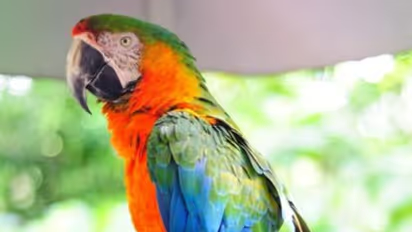What is Parrot fever? Symptoms, treatments of this outbreak that killed 5 people in Europe

Synopsis
Psittacosis, a respiratory bacterial infection often known as parrot fever is a bacterium that primarily affects birds, such as parrots, pigeons, and poultry, but it can also be transmitted to humans through inhalation of contaminated dust particles or bird droppings.
Psittacosis, a respiratory bacterial infection often known as parrot fever, killed five individuals in Europe this year. Birds infected with Chlamydophila psittaci (C. psittaci) can transmit the virus to people if they inhale particles from their feathers or dry feces. According to WHO, it is uncommon for people to convey the bacteria that causes psittacosis to other humans, and the disease has a low risk of spreading from person to person. If correctly diagnosed, this pathogen is treated with antibiotics.
Symptoms of parrot fever in humans may include:
Fever: Parrot fever often presents with a high fever, which may persist for several days or weeks.
Chills and Sweating: Patients may experience chills and profuse sweating, especially during episodes of fever.
Headache: Headaches are common in individuals with parrot fever and may range from mild to severe.
Muscle Aches and Joint Pain: Patients may experience muscle aches and joint pain, similar to symptoms of influenza.
Cough: Parrot fever can cause a dry or productive cough, along with respiratory symptoms such as shortness of breath or chest discomfort.
Fatigue: Patients may feel tired, weak, and lethargic, often accompanied by a lack of energy.
Pneumonia: In severe cases, parrot fever can lead to pneumonia, characterized by chest pain, difficulty breathing, and coughing up mucus.
Gastrointestinal Symptoms: Some individuals may experience gastrointestinal symptoms such as nausea, vomiting, abdominal pain, or diarrhea.
Also read: Maha Shivratri 2024: Shiv Tandav Stotram to Har Har Mahadev, 5 Mahadev-related songs
Treatment
Treatment of parrot fever typically involves antibiotics, such as doxycycline or tetracycline, to eradicate the bacterial infection. The duration of antibiotic treatment may vary depending on the severity of the illness and the patient's response to therapy. In addition to antibiotics, supportive care, including rest, hydration, and fever-reducing medications, may be recommended to alleviate symptoms and promote recovery.
Prevention of parrot fever involves practicing good hygiene when handling birds or bird-related materials, such as cages, feathers, or droppings. It is essential to wash hands thoroughly with soap and water after handling birds or cleaning bird cages. Additionally, individuals at higher risk of exposure to birds, such as pet owners, bird breeders, or poultry workers, should take precautions to minimize the risk of infection, including wearing protective clothing and masks when handling birds or cleaning bird habitats.
If you suspect you have been exposed to parrot fever or are experiencing symptoms consistent with the illness, it is essential to seek medical attention promptly for proper diagnosis and treatment.
Explore the latest Lifestyle News covering fashion, wellness, travel, Food and Recipes, and more. Stay updated with trending Health News, fitness tips, and expert insights to inspire your daily living. Discover personalized lifestyle trends that keep you stylish and informed. Download the Asianet News Official App from the Android Play Store and iPhone App Store for everything that adds value to your everyday life.